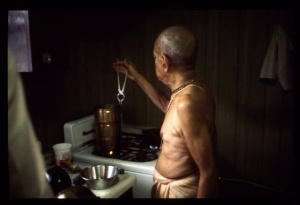SB 6.19.19-20

A.C. Bhaktivedanta Swami Prabhupada
TEXTS 19-20
viṣṇor vratam idaṁ bibhran
na vihanyāt kathañcana
viprān striyo vīravatīḥ
srag-gandha-bali-maṇḍanaiḥ
arced ahar-ahar bhaktyā
devaṁ niyamam āsthitā
udvāsya devaṁ sve dhāmni
tan-niveditam agrataḥ
adyād ātma-viśuddhy-arthaṁ
sarva-kāma-samṛddhaye
SYNONYMS
viṣṇoḥ—of Lord Viṣṇu; vratam—vow; idam—this; bibhrat—executing; na—not; vihanyāt—should break; kathañcana—for any reason; viprān—the brāhmaṇas; striyaḥ—women; vīra-vatīḥ—who have their husband and sons; srak—with garlands; gandha—sandalwood; bali—offerings of food; maṇḍanaiḥ—and with ornaments; arcet—one should worship; ahaḥ-ahaḥ—daily; bhaktyā—with devotion; devam—Lord Viṣṇu; niyamam—the regulative principles; āsthitā—following; udvāsya—placing; devam—the Lord; sve—in His own; dhāmni—resting place; tat—to Him; niveditam—what was offered; agrataḥ—after dividing first among the others; adyāt—one should eat; ātma-viśuddhi-artham—for self-purification; sarva-kāma—all desires; samṛddhaye—for fulfilling.
TRANSLATION
One should accept this viṣṇu-vrata, which is a vow in devotional service, and should not deviate from its execution to engage in anything else. By offering the remnants of prasāda, flower garlands, sandalwood pulp and ornaments, one should daily worship the brāhmaṇas and worship women who peacefully live with their husbands and children. Every day the wife must continue following the regulative principles to worship Lord Viṣṇu with great devotion. Thereafter, Lord Viṣṇu should be laid in His bed, and then one should take prasāda. In this way, husband and wife will be purified and will have all their desires fulfilled.